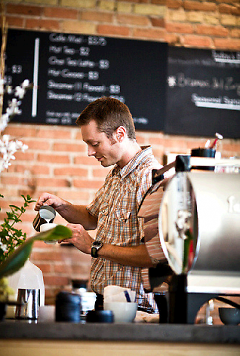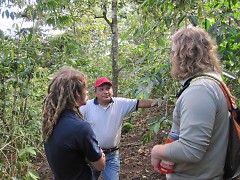What's in your cup this morning?
Coffee has been part of human history for hundreds of years and is a common morning ritual across the world. Whether it's brewed stove top, in a coffee pot, espresso machine, moka pot, french press, chemex; or, heavens forbid – gotten from the closest gas station or brewed in a vending machine, many of us do not think of our coffee's journey beyond its stimulating effects as we sip it each morning.
Where does your coffee come from? Where is it grown? Why does it matter? How do these conditions affect how the espresso or latte taste? What about the roast? There are so many variables that come into play when brewing the perfect cup of coffee; and while we may not be thinking about this complexity sip for sip, the experts at MadCap Coffee in Grand Rapids certainly are.
Located on the bustling hub of 98 Monroe at Ottawa Avenue in downtown Grand Rapids, MadCap Coffee has become a mecca for excellent coffee in Grand Rapids. MadCap celebrated its first anniversary in January.
“MadCap's goal from the start has been to provide customers with a cup of coffee that in a sip, can tell the 'seed to cup' story,” said Trevor Corlett, owner of MadCap Coffee. “Our single-minded purpose is to offer the highest quality coffee we can source ... Our biggest challenge is educating our customers about coffee's 'seed to cup' process, showing them the journey coffee takes before getting to their cups and how that journey affects the resulting taste.”
The Journey of the Coffee Bean
At the root of MadCap's operation are the coffee farmers. MadCap coffee buyer Chad Morton, explained MadCap supports a supply chain that is both transparent and sustainable at every point along the line.
“We go to the origin. We have direct-trade farms in Guatemala, Honduras, Costa Rica.” Morton said they are also cultivating relationships with farmers in Brazil and are prospecting coffee farms in Kenya. MadCap buys coffee from small scale growers that cultivate high-quality, single varietals (much like grape production in the wine industry).
“It's beyond what's being labeled as 'Fair Trade,' which in some cases doesn't mean anything,” Morton said. “It's direct trade, and it starts with the farmer. We have direct relationships with the farmers and growers, educating them on what we need in our coffee shop so they can grow the best possible coffee. We then work with them to get them the best possible price for their high-value crop.”
Moreover, creating a fair, equitable market in which coffee farmers can sell their coffee is also about social justice. “Seeing small kids hauling large baskets of coffee cherries certainly makes you more willing to pay a few more cents a cup to make sure the farmer and their family gets a fair wage,” Morton said. “But high-quality coffee is always, always a must.”
Beyond the Farms, Into the Shop
When the green coffee beans arrive in Grand Rapids, MadCap roasts them with patience and care under the right heat to bring out its perfect balance of flavors. This mindful roasting brings out the subtle characteristics of the coffee cherry.
Ryan Knapp, MadCap roaster and barista, explained why their coffees are a lighter roast. “With great coffee we are able to keep our roasts slightly lighter allowing the inherent flavors to come through.”
Knapp explained the drawbacks of the popular trend of heavily dark-roasted coffees. “When coffee gets roasted really dark, the [complex] coffee flavor no longer comes through when you taste it. Rather, you begin to taste smokey, woodsy notes that come from the roast ... None of our roasts go very dark, as we want to make sure the customer can taste all the hard work that has gone into the coffee bean before it has reached our doorstep.”
The “hard work” Knapp referred to are the agricultural conditions under which the coffee is grown. All the aspects of soil, altitude and growing technique is embedded in the bean, resulting in unique flavor characteristics.
“Take altitude, for example,” Knapp explained. “Higher altitudes generally lend to a much brighter and acidic cup of coffee … and coffee grown in lower altitudes have a flavor that is very low in acidity.”
One can taste the differences in altitude by comparing MadCap's Masha (Burundi, 1,850 meters above sea level) and Fazenda Macaubus (Brasil, grown at an altitude of 1,100 meters above sea level). Due to the very high elevation in Burundi, the bright sweetness comes through upfront in the Masha; whereas the Macaubus, grown at a lower elevation in Brasil, contains flavors full of body and very low acidity, with some inherent caramel dark chocolate sweetness.
From Bean to Brew
Of course, it comes as no surprise that MadCap baristas don't just brew drip coffee. According to Knapp, “Our baristas are coffee-focused culinary experts … They know all of the coffee on our offering list -where they originate, who farmed them, what elevation it was grown, how it was processed and the best brew method.”
It's all about the training and attention to detail. Knapp explained espresso: “Because so many variables go into a shot of espresso, our baristas are tasting espresso on average 10 times during a 5-hour shift to assure that the extraction is bringing out the best flavors. If the flavor is off, the barista will adjust the grind, dose, temperature or extraction time.”
To what end does all this training and expertise matter? “Our hope is that our customers will think of a fine dining [coffee] experience, where they can trust the staff and their knowledge rather than just a typical coffee shop/fast food experience,” Knapp said.
Their coffee-focused culinary expertise is paying off. Not only do they have a cult-like following of local foodies and creatives, but MadCap's barista talent took top honors in the Great Lakes Barista Competition in March and will travel to Anaheim later this spring for a national barista title.
Owner Corlett feels that MadCap is at the head of the pack nationally with its barista talent. “We're definitely striving to be the best at what we do,” Corlett said. “The success we've had at the barista competitions recently is a testament to the passion we have for coffee. Also, the competitions are a great opportunity for us to see how the coffees we are purchasing, and how we prepare them, stack up to what others in the industry are doing.”
Knapp said that he hopes to do well in the barista competition in Anaheim. “Realistically, I would like to make it into the semi-final round. But most importantly, I want to have fun and represent the coffee. That’s what it’s supposed to be about.”
Click here to see MadCap Baristas brewing in action: http://vimeo.com/9488163. Video by Thomas Valdez.
Disclosure: Lisa Rose Starner is a Grand Rapidian and has worked in the area of food and community in Grand Rapids for nearly a decade. This is the first of many food-related articles for her new series in the Rapidian, The Local Beet. An avid gardener and cook, Lisa grows vegetables and herbs with her family on Grand Rapids' West Side. Beyond holding a degree in anthropology and a Masters in Public Administration; Lisa is currently a student of Great Lakes herbalist, Jim McDonald. She is enjoying her newest hyper-local food adventure as a backyard herbalist.
The Rapidian, a program of the 501(c)3 nonprofit Community Media Center, relies on the community’s support to help cover the cost of training reporters and publishing content.
We need your help.
If each of our readers and content creators who values this community platform help support its creation and maintenance, The Rapidian can continue to educate and facilitate a conversation around issues for years to come.
Please support The Rapidian and make a contribution today.



